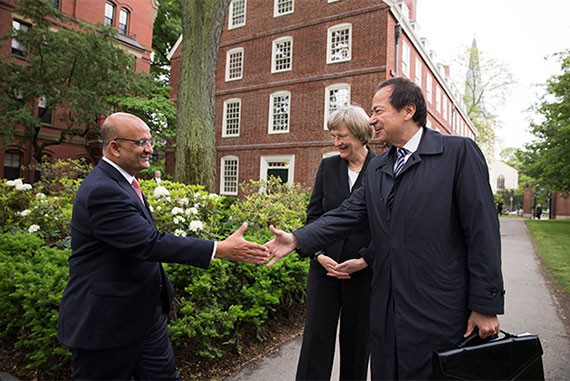Paulson gifts $400M to Harvard

Harvard announced that the billionaire hedge fund
manager John A. Paulson had given a $400 million endowment to support the
School of Engineering and Applied Sciences , the largest gift in the
university’s history.
Drew Gilpin Faust, the president of Harvard, said in a
statement that Mr. Paulson’s appreciation for the importance of the engineering
school to faculty, students and schools across the university had led to the
gift. The donation, Dr. Faust said, will change Harvard and enhance our impact
on the world beyond.
Mr. Paulson, 59, a 1980 graduate of Harvard Business
School, is the founder of Paulson & Co., a hedge fund that manages $19.5
billion for wealthy individuals and pension funds like the New York State
Common Retirement Fund.
He is among the best paid hedge fund managers and took
home $2.3 billion in 2013, according to a ranking by Institutional Investor’s
Alpha magazine. He is also known for his expensive taste in art; the walls of
his office in Rockefeller Center in Manhattan are lined with Alexander Calder
watercolors.
His gift to Harvard helped the university’s $6.5
billion fund-raising campaign, which started publicly in September 2013. As
soon as the gift was announced, a chorus of criticism erupted, much of it
mocking Mr. Paulson for choosing to add to Harvard’s wealth rather than extend
his generosity to causes or institutions that help the needy.
The engineering school, to be renamed the Harvard John
A. Paulson School of Engineering and Applied Sciences, is expanding across the
river from Cambridge, Mass., to Allston, to a new science campus adjacent to
Harvard Business School and the Harvard Innovation Lab.
Since 2007, the engineering school has added
undergraduate concentrations in biomedical engineering, mechanical engineering
and electrical engineering, as well as a master’s program in computational
science and engineering. Course enrollment has increased by nearly 150 percent.
For 379 years, Harvard has had a profound global impact
across a multitude of disciplines that benefits all of humanity, Mr. Paulson
said in a statement. “SEAS is the next frontier for Harvard, and its expanding
campus in Allston promises to become the next major center of innovation.”
In recent years, the engineering school’s labs have
developed an organ-on-a-chip platform that can be used for drug testing,
self-organizing robots, nanotechnology devices that are changing optical
electronics, an implantable cancer vaccine and new knowledge about the links
between atmospheric chemistry and climate change.
Harvard received its second-largest gift, $350 million
from the Morningside Foundation for the School of Public Health, last year.
source:nytimes.com
image
courtesy:news.harvard.edu
Post Your Comments for this News
Related Articles
-
Tips for Teaching Coding in Classroom
2017-06-16 12:39:35
-
How to Prepare for Student Orientation Day
2017-05-18 12:53:05
-
World Day for Cultural Diversity for Dialogue and Development.
2017-05-18 10:27:42
-
Big Data for Big Impact #WTISD-17
2017-05-17 09:28:16



